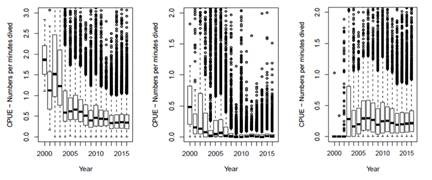A stock assessment of the Seychelles sea cucumber fishery was first undertaken by MRAG Ltd in 2012 for the Seychelles Fishing Authority (SFA). A number of constraints limited the provision of management advice during that time, including the length of the time-series and resolution of both spatial and effort data. Since 2012, additional fisheries-dependent information has been collected including higher resolution VMS data and fishing effort.
The main objectives of this study were to conduct a re-assessment of the fishery using all available fisheries-dependent data, and to provide advice to guide management decisions on the sea cucumber fishery in 2017. Specifically this included:
- An analysis of CPUE data to demonstrate the evolution of the fishery and its concordance with global trajectories in sea cucumber fisheries.
- Examine CPUE data at appropriate spatial scales for evidence of hyperstability and sequential depletion, or evidence of deeper diving or increase dive time to maintain catch rates.
- Where feasible, use statistical models (e.g. GAMs, GLM) to develop standardised CPUE series for subsets of data
- Reapply surplus production models conducted in 2012 to determine if the longer data-series improve model fits.
- Conduct preliminary analyses to explore the potential for stock reduction analysis (SRA) to be used in providing management quantities for the principal target species.
- Provide management advice based on the weight of evidence from all available indicators and assessments.
Both assessment methods using number of animals landed (rather than biomass), showed evidence of local depletion for several key commercial species, including a dramatic decline in black teat in highly fished areas. A number of recommendations were made, which include to focus on a select group of species only; develop a definitive dataset without errors that can be used to run alternative models in future; conduct fisheries-independent surveys; closed areas as part of an adaptive management plan; conduct biological sampling to determine reproductive capacity and mortality.
A final report and workshop presented the findings and recommendations to local stakeholders. The workshop also included training on the main assessment software used (surplus production model; CEDA).

